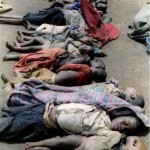 General Bosco Ntaganda, a Congolese warlord held by the International Criminal Court (ICC) at the Hague for war crimes and crimes against humanity committed in Eastern Democratic Republic of Congo (DRC) between 1997 and 2011 will be charged for crimes he committed in Rwanda in 1995, his relatives tell AfroAmerica Network.
General Bosco Ntaganda, a Congolese warlord held by the International Criminal Court (ICC) at the Hague for war crimes and crimes against humanity committed in Eastern Democratic Republic of Congo (DRC) between 1997 and 2011 will be charged for crimes he committed in Rwanda in 1995, his relatives tell AfroAmerica Network.
Photo: Children Massacred in Kibeho by Rwandan Patriotic Front
General Bosco Ntaganda was transferred to the ICC after spending days hauled within the compound of the US Embassy in Kigali, Rwanda. He had surrendered to the US Embassy on Monday March 18, 2013, fleeing for his life, when he found out that Rwandan Military Intelligence operatives were after him (see our March 19, 2013 article: General Bosco Ntaganda Evades Rwandan DMI Killing Squad).
Preparing for the Defense of Imprescriptible Crimes
Since his transfer to the Hague, General Bosco Ntaganda has been preparing for his defense with the help of select lawyers. Before his surrender, his case was built around the crimes he allegedly committed in Eastern and North Eastern DRC. Meanwhile, the prosecution has decided to expand the charges to all imprescriptible crimes committed in Rwanda and elsewhere. Among the imprescriptible crimes identified by the Prosecution, accusations of which cannot lapse with time, were the massacre of internally displaced Rwandan refugees in Kibeho on April 22, 1995.
The Kibeho Massacre: A Scourge of The Rwandan Patriotic Army on Rwandan People.
The Kibeho massacre occurred in a camp for internally displaced persons(IDP) near Kibeho, in Southern Rwanda on April 22, 1995, 18 years ago this week, under the helpless watch of Australian blue helmets serving as part of the United Nations Assistance Mission for Rwanda (UNAMIR). UNAMIR estimated that at least 4,000 people, mostly children in the camp were killed by soldiers of the ruling Rwandan Patriotic Front (RPF), known as Rwandan Patriotic Army (RPA), now transformed into Rwandan Defense Forces (RDF). The Commander of the troops who conducted the massacres was General, then Colonel, Fred Ibingira, the current Chief of Staff of Rwandan Defense Forces Reserve Forces. Then Rwandan President Pasteur Bizimungu rushed to tell the World that only 330 civilians had been massacred.
According to Medecins Sans Frontiers (MSF) doctors and MINUAR troops that witnessed the massacres, around 10 am, the civilians gathered in a hospital compound in Kibeho under heavy rain. RPA forces who had surrounded the compound began firing into the crowd in the hospital compound and at fleeing refugees for the next two hours. The RPA soldiers initially used automatic weapons to fire into the masses that included mostly children, women, and the elderly. The, the RPA troops switched to 60mm mortars, grenades, and other weapons of mass destruction.
General Bosco Ntaganda Participated in the Massacre
According to sources within Rwandan Defense Forces (RDF) and who were also members of the Rwandan Patriotic Army (RPA) at the time, General Bosco Ntaganda, then a low ranking officer, was among the troops that led the massacre of the civilians under the command of Colonel Fred Ibingira. For that reason, the ICC prosecutor has decided to add these crimes to General Bosco Ntaganda’s long list of war crimes and crimes against humanity.
General Bosco Ntaganda’s line of Defense: “We were given orders”
According to sources close to General Bosco Ntaganda’s relatives, General Ntaganda’s line of defense will be that the troops were given the orders to shoot at the refugees. The sources add that the orders came from the top of the Rwandan Patriotic Army (RPA) and ultimately General Paul Kagame himself.
Other sources in contact with General Ntaganda confirmed the new accusations by the ICC Prosecutor and the defense strategy. According to the sources, “General Ntaganda, was a low ranking soldier. His unit was ordered to shoot at the Rwandan ex-FAR and found out that they were really civilians afterwards. Maybe Colonel Ibingira knew it. But the orders come from well above him. At least that is what he told his unit.”
©2013 AfroAmerica Network. All Rights Reserved.




Comments on this entry are closed.
The Rome Statute does not operate restroctively. thats why Joseph Kony was charged with crimes committed after 2002.
the Rome statute does not operate retrospectively. thats why Joseph Kony was charged for crimes committed after 2002. may be the ICTR.
Please see our comments on the subject.
This guy is a criminal! Kiwanja, Mugunga, Masisi and other massacres are enough to prosecute him. Will the ICC have jurisdiction on crimes committed before its creation? I doubt!!!
Hello Kanisius,
you are right.
The crimes committed in Kibeho in 1995 alone cannot be prosecuted by ICC. The pattern of criminal activities constitutes a reason enough for the ICC Prosecutor to initiate investigations “proprio motu” (on his/her own impulse) in building the case that falls within ICC jurisdiction. In that sense, he/she has the right to charge a criminal and use the prior similar crimes as supporting evidence. Perhaps, not to say surely, that is what General Ntaganda’s relatives referred to when they communicated with AfroAmerica Network.
The decision to reject the case on the basis of the jurisdiction of the court is made by the Pre-Trial Chamber of the ICC.
On the other side, the Defense may introduce the pattern in previous situations to show that General Ntaganda has always been mislead to executed orders, from his superiors. “Superior Orders” are not an excuse in genocide and crimes against humanity but are acceptable for “war crimes”. Hence the Defense may use them as a pattern in Kibeho, Ituri, Kiwandja, etc. and paint General Ntaganda as also a victim of his superiors.
Regarding imprescriptible crimes, AfroAmerica Network is aware of discussions going on at the ICC, IC, and the UN Security Council regarding who has the right to try such crimes if states refuse to prosecute their citizens. Based on our sources at the UN, there are differing views: some believe that ICC statutes need to be revised to account for that or to ask the UN Security Council to refer such cases to the ICC.
Best – David O’Brien.
One more criminal identified in the mrders of Kibeho. When one will fall (f.e.Ntaganda) all the others will also fall. We must at least hope it. Thanks to AfroAmerica for their accurate informations.
Afro-America,
Well done for this article. Even if it would be difficult for the ICC to try cases that happened before its existence, this article has the merit to create uneasiness among people close to Paul Kagame. And that is commendable. First we learn that Bosco was in the squad that killed innocent civilians in Kibeho, then we learn that he is prepared to point the finger, not at Ibingira, but at Kagame himself. Those like myself who follow and believe in prophecies about Rwanda will tell you that these accusations against Kagame will not move out of power but will certainly shake his horn (leadership). It is also good because once it is shaken (which hurts) the root will rot and it will be easy to pluck it out. Prophecies predicted this would happen 4 times but he has gone past 4 already.
So Kagame is warned, his days are numbered.
Thank you Afro-America for an interesting article